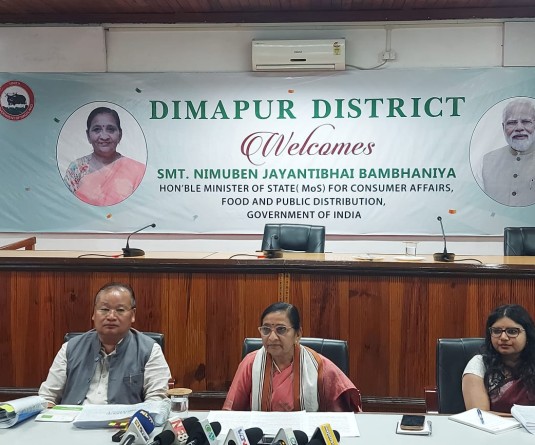General Manager, FPAI, Nagaland Branch, Vincent Belho along with Humanitarian respond team during a media meet at Kohima on October 31. (Morung Photo)

Morung Express news
Kohima | October 31
Observing the need to advance right to sexual and reproductive health information and services especially during crisis, Family Planning Association of India (FPAI), Nagaland Branch has said that at the local level, the state have a state unit in Kohima to respond to humanitarian crisis in emergencies also called Sexual Reproductive Health Minimum Initial Service Package (MISP) Humanitarian Response in Emergencies.
General Manager, FPAI, Nagaland Branch, Vincent Belho along with a humanitarian respond team said during a media meet in Kohima today that since 1949, the Association has worked towards providing wide range of services, including family planning, HIV prevention, maternal health, and adolescent sexual health education.
According to statistics, Belho said the global humanitarian crisis displaces about 34000 each day due to natural hazards, climate change, armed conflict, epidemics, complex emergencies, etc. "Women and girl's need for reproductive health care is not suspended in crises. One-quarter of people affected by crises are women and girls aged 15-49. One in five women are likely to be pregnant and one and five of all deliveries will experience complications. In crisis settings there is also a heightened risk of early marriage, rape and sexual violence, unsafe abortions, unattended births, SGBV and un intended pregnancies. Transmission rates of STIs, including HIV, increase in emergencies," he said.
He said during this situation, there is urgent need for access to confidential and safe sexual and reproductive health services and referral pathways.
Through the implementation of the Minimum Initial Service Package (MISP) for reproductive health, Belho added that FPA India has provided vital support to vulnerable populations affected by natural disasters, conflicts, and other emergencies.
He further explained that MISP is an internationally recognized set of priority actions designed to address reproductive health needs during the onset of a humanitarian crisis. It focuses on preventing excess maternal and neonatal mortality, managing sexual violence, and ensuring access to contraception, among other essential services.
He mentioned that the FPAI had implemented MISP during several critical humanitarian crises like floods and Cyclones in regions hit by severe floods and cyclones, covid 19 pandemic, and conflict crisis in temporary settings especially in rural and underserved areas and mentioned services displaced populations in Manipur.
He further pointed out initiatives in the feild by FPA closely working with local governments, international partners, and other non-governmental organizations. "This collaborative approach has been instrumental in scaling up the MISP initiative and ensuring a coordinated response to humanitarian emergencies."
Apart from that Belho also said that the FPAI conducts training for healthcare workers and CSO Partners on MISP protocols and empowering local communities to manage SRH services during crises.
He iterated that the Association, in addition is committed to its mission of ensuring access to life-saving SRH services.
"By strengthening its partnerships and continuing to prioritize MISP in its emergency response efforts FPA India is well-positioned to meet the reproductive health needs of those affected by future crises," he said.
Belho said more efforts needed for wider population and crucially the young population to be aware and skilled to face any eventuality of disaster, while we must be prepared with pre-positioned essentials, like medicines, equipment and skills to be a resilient society in the face of any disaster.





